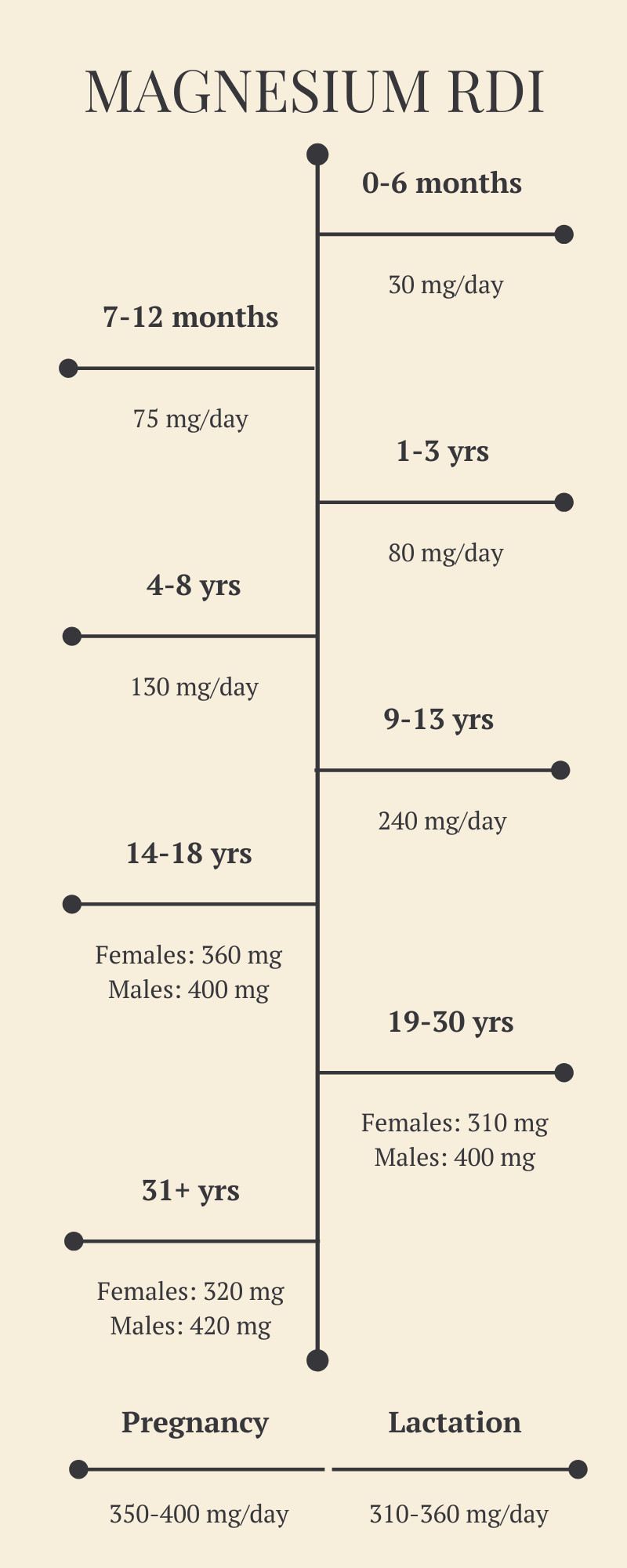
However, while it’s great to be sceptical about what you’re putting into your body, and how much of what you read is simply marketing in disguise, there is one vitamin in particular you should consider making a part of your daily routine… Magnesium!
Magnesium is the miracle vitamin responsible for more than 300 reactions in your body, and chances are, you’re not getting enough of it. Almost none of us are…
Magnesium is an essential mineral required for the initiation of 300 metabolic reactions in your body. It plays a vital role in protein synthesis, blood sugar and blood pressure regulation, muscle and nerve function, and energy production.
Since Magnesium cannot be manufactured by your body, it must be taken in. However currently, many people aren’t getting enough Magnesium through diet alone. This can cause significant problems if supplementation isn’t used to support your body…
Why is Magnesium so important?
As a cofactor for more than 300 enzyme systems, Magnesium is essential for endless processes in your body, including energy generation, enzyme activation, and even supporting your metabolism.
Its role is largely regulatory, acting as a switch to activate enzymes to stop or start activity in your body. This makes Magnesium critical for many body processes.
- Protein synthesis
- Glucose and fat breakdown
- Muscle and nerve transmission
- Neuromuscular function
- Blood glucose and blood pressure levels
- Creation of DNA and RNA
It also plays a critical role in the active transport of calcium and potassium ions across cell membranes. Sound complicated? Essentially, this process means that your nerve impulses, muscle contractions and heart rhythm can continue to function! It also supports kidney function and helps remove acid from your body, to maintain the acid-base balance you require to thrive.
Being an essential component in allowing things to pass across cell membranes, Magnesium is also very important in enabling thousands of biochemical processes, including mineral balance – critical for maintaining cell life. It plays a vital role in immune system health, acting as a cofactor to enzymes involved in your body’s inflammatory response, and promoting the synthesis, release and activity of healthy immune cells.
Most importantly of all, Magnesium is required in the process producing ATP, the main energy currency of your body. Without ATP generation, your cell functions cannot continue.
This means if you don’t get enough Magnesium, you can experience a wide range of side effects and even diseases.
How is Magnesium absorbed?
Magnesium levels are regulated primarily by your kidneys, with between 24-76% of Magnesium from diet and supplementation being absorbed in your gut, and the remainder excreted as waste. Your kidneys regulate the amount of Magnesium being excreted, depending on the level present in your blood – basically any excess that your body doesn’t need or want gets eliminated as waste.
Around half of your body’s Magnesium is found in your bones, and another third in muscles and soft tissue.
How much Magnesium do you need?
The amount of Magnesium you require varies by life stage, age and gender. The recommended daily intakes according to the Australian Government National Health and Medical Research Council are as follows:

Why aren’t we getting enough?
The most common causes of Magnesium deficiency in western countries are the quality of soil, and diet quality.
Considering most of the western world consumes significant amounts of processed foods, they aren’t getting adequate Magnesium intake from the soil used to grow foods.
And what’s more, the agricultural practices used have made much of the soil deficient in Magnesium, meaning even those who eat a largely unprocessed diet aren’t eating enough Magnesium through food sources alone. Magnesium largely comes from the soil in which our fruit and veggies are grown, so as soil quality in Australia becomes worse and worse, so too do your chances of getting enough Magnesium through your food alone.
- High fibre intake. This can lower absorption of Magnesium if fibre intake is over 40-50g per day.
- High Zinc intake. Over 142 mg/day of Zinc can prevent Magnesium absorption.
- Excessive or inadequate protein intake. More than 94 g per day may result in excess excretion of Magnesium, while less than 30 g per day can reduce absorption of Magnesium.
- Kidney function. Given the kidneys play a key role in Magnesium balance and absorption, it is important that your kidneys are functioning normally and maintaining a normal acid-base balance in your body.
- Poor diet.
- Some health conditions, including type II diabetes and some digestive conditions.
- Some medicines when taken for long periods of time.
- Alcoholism.
- Diarrhoea or excessive urination.
- Weight loss or anorexia.
- Other diseases or syndromes can also impact Magnesium absorption and levels in the body.
Symptoms of Magnesium Deficiency
Most people will never even realise they’re lacking Magnesium, as many of the signs and symptoms aren’t too severe.
Things such as muscle cramps and spasms, fatigue, poor sleep, moodiness, heartbeat irregularities and migraines can all be signals that your Magnesium levels are lower than they should be.
- Decreased appetite
- Nausea or vomiting
- Fatigue
- Shakes
- Muscle spasms or cramps
- Weakness or sleepiness
- Abnormal heart rhythm
- Pins and needles
How can you ensure you’re getting enough Magnesium daily?
To reach these optimal levels of Magnesium intake, you have to ingest Magnesium – either through food or supplementation.
- Green vegetables
- Legumes
- Beans
- Nuts
- Shellfish
- Meat
- Unprocessed cereals

The ability of your body to absorb Magnesium depends largely on each individual, ranging from 25% to 75% absorption rate. When using supplements, the type of Magnesium included in the supplement, as well as the form the supplement takes, also influence the amount of Magnesium you can effectively absorb.
Different Types of Magnesium
Magnesium only occurs naturally with other elements, meaning supplements usually combine Magnesium with another substance such as salt, or amino acids. Each of these substances has a different bioavailability, meaning each is absorbed differently by your body. Basically, the amount of Magnesium you can absorb is based on how soluble the Magnesium compound or supplement is, and the amount of elemental Magnesium it releases when you consume it.
Remember, the existing Magnesium levels in your body play an important role here… Magnesium will not be as readily absorbed if you already have adequate levels of Magnesium in your body. Instead, excess Magnesium will be excreted through urine or faeces.
Some of the most common forms of Magnesium in supplement form and their benefits are below:
More research is needed to be sure of the most effective form of Magnesium supplementation.
However we do know that the water solubility of Magnesium supplementation is important in determining the bioavailability and oral absorption of the mineral. Those forms which dissolve well in liquid are more able to be absorbed by your gut and pass into your bloodstream than the less soluble forms of Magnesium.
While there is plenty of conflicting research on which form this is, there is some evidence suggesting that powdered forms of Magnesium are absorbed more effectively than tablet or capsule forms, helping you replenish your stores of this important mineral!
Magnesium oils are becoming more and more popular, with the oil soaking into your skin without any greasiness, and helping to improve skin health along the way. Again, this is arguably a hugely effective way of getting your Magnesium fix, as it bypasses your digestive system (which can block up to 90% of regular supplements from being absorbed) and is absorbed straight into the bloodstream (though of course you lose some through skin and other barriers along the way).
Epsom salt is a great method of Magnesium supplementation for those with sore muscles, however it isn’t the most convenient or regular method of boosting your levels to where they need to be.
Whatever form you decide on, the good news is that, with regular usage, you can restore your Magnesium levels to where they need to be, meaning you can wave goodbye to headaches, mood swings, cramps and spasms, and say hello to better sleep, improved muscle recovery and more emotional stability. Yes please!




